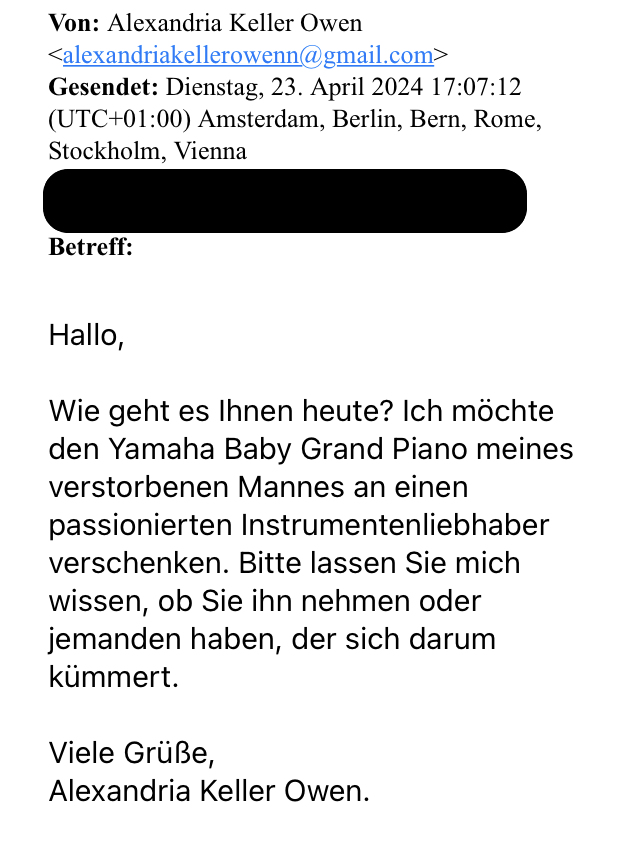Musicians, especially pianists, are currently the focus of a sophisticated wave of fraud. The scammers use a seemingly heartbreaking story: A supposed widow offers via email a high-quality piano, often a Yamaha Baby Grand, that once belonged to her late husband. The scam is part of a classic advance fee fraud in which the perpetrators lure victims with emotional stories and the promise of high-quality, free goods.
The call of the free piano
The principle of this scam is as simple as it is effective. The fraudsters send masses of emails in which they pretend to want to give away the valuable instrument. The messages appear personal and trustworthy. This is how a typical scam email begins: “Hello, how are you today? I would like to give away my late husband's baby grand piano to a passionate instrument lover. Kind regards, Alexandria Keller Owen.”

The trap springs shut
Anyone who responds to the tempting offer will quickly fall into the clutches of criminals. At first everything seems harmless: address details are requested in order to supposedly organize the shipping of the piano. But then it gets expensive. The scammers claim that there are fees for transporting the instrument, which the recipient should pay in advance. But the promised delivery never takes place. The shipping company does not exist - it is another invention of the perpetrators.
Classic advance fee fraud
This approach is a typical example of so-called advance payment fraud. Victims are lured with the promise of great value, but are asked to pay in advance - be it for shipping, fees or other fictitious costs. In reality, neither the promised money nor the promised valuables exist. The victims continue to pay until the fraud is exposed.
Piano spam scam questions and answers
Question 1: How can I protect myself from such scams?
Answer 1: Be especially wary of offers that sound too good to be true. Insist on personal contact and verify the identity of the provider through independent sources.
Question 2: What should I do if I have replied to such a scam email?
Answer 2: Immediately stop any further contact and inform your bank and the police. The latter can also help you with filing an advertisement.
Question 3: How do I recognize a serious offer?
Answer 3: Reputable offers usually do not require advance payments without a secure contractual basis and offer opportunities to check the offer details.
Question 4: How common are such scams?
Answer 4: Advance fee fraud is widespread and uses various pretexts to deceive people. The methods change, but the basic principle remains the same.
Question 5: Do I get my money back if I have already paid?
Answer 5: Unfortunately, the chances of getting money back that you have already paid are very low. However, those affected should not hesitate to report the incident to the police.
Conclusion
It is important to remain vigilant and to critically question offers, especially if they come by email and seem surprisingly cheap. Advance fee fraud aims to extort payments under false pretenses. Suspicious emails should therefore be ignored or, if in doubt, checked. We encourage those affected to contact the police if they have any questions or suspect fraud and to use the opportunity to find out about current fraud schemes, for example via the Mimikama newsletter or by taking part in online lectures and workshops.
Further information and registration at https://www.mimikama.org/mimikama-newsletter/ and https://www.mimikama.education/online-vortrag-von-mimikama/.
Source: wat c hlist-internet
Also read:
Notes:
1) This content reflects the current state of affairs at the time of publication. The reproduction of individual images, screenshots, embeds or video sequences serves to discuss the topic. 2) Individual contributions were created through the use of machine assistance and were carefully checked by the Mimikama editorial team before publication. ( Reason )

